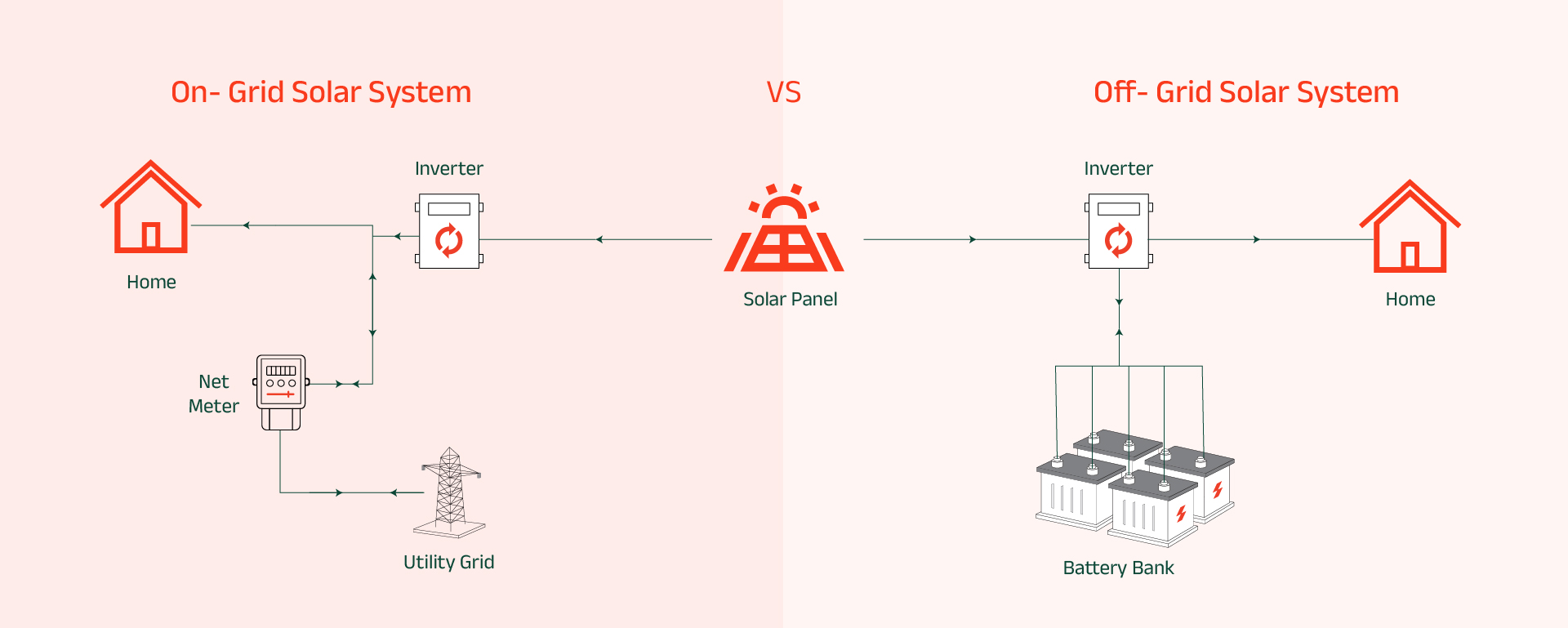Table of content
- Difference Between Off grid and On grid Solar System
- On Grid vs Off Grid Solar: Selecting a Suitable Solar System for Your Needs
Did you know that, post the Union Budget 2024, the renewable energy sector of India is likely to touch 500 GW by 2030 more efficiently? Accordingly, the latest research by CRISIL shows that times are good for renewable energy. From a capacity of 72 GW in FY20, the sector witnessed a 35% jump to 97 GW in FY22, with capacity poised to surge to 180 GW by FY26.
Did you know that, post the Union Budget 2024, the renewable energy sector of India is likely to touch 500 GW by 2030 more efficiently? Accordingly, the latest research by CRISIL shows that times are good for renewable energy. From a capacity of 72 GW in FY20, the sector witnessed a 35% jump to 97 GW in FY22, with capacity poised to surge to 180 GW by FY26.
Solar power is not a compulsion but it is slowly taking the shape of a smart business decision. With so many options available in the market, selecting the right solar system seems daunting. But the bigger question is: which solar system to opt for-on-grid or off-grid? Don’t worry; we’ve got you covered. A blog such as this one will become your all-in-one guide to what’s difference between an off grid and on grid solar system—information quite critical for making the right choice for your unique energy needs. Keep reading and find both the positive and negative sides of both in this text, with a view of an overview of the comparison chart at the end for easier decision-making.
An off grid solar system is a standalone power generation unit that is not connected to the conventional electrical infrastructure. It comprises solar panels, charge controllers, batteries, and inverters. Solar panels convert sunlight into direct current (DC) electricity, which is then stored in batteries after being regulated by the charge controller. The inverter then converts the stored DC electricity to usable AC power for your appliances.
Now that you have learned about what is off grid solar system, let us learn about on grid solar systems to understand the difference between on grid and off grid solar systems.
An on-grid solar system is one that is hooked to the main electrical grid. It produces electricity from the solar panels and feeds the surplus power back into the grid, receiving credits for it. In times when solar generation may not suffice, it draws power from the grid. Now, that you know what is on grid solar system, let’s look at some of its key components and advantages.
| Feature | On-Grid Solar System | Off-Grid Solar System |
| Grid Connection | Connected | Independent |
| Battery Storage | Optional | Essential |
| Power Generation | Continuous (with sunlight) | Dependent on sunlight and battery storage |
| Backup Power | Grid | Batteries |
| Initial Cost | Lower | Higher |
| Maintenance | Lower | Higher (battery maintenance) |
| Net Metering | Eligible | Not applicable |

Selecting the right solar system depends on various factors:
Sunsure Energy can help you tap the sun’s potential. With our expertise and commitment to sustainability, we are dedicated to accelerating corporations in their journey toward RE100—a global initiative for which businesses are supposed to commit to 100% renewable energy.
We have a comprehensive suite of services tailored to your business needs. Our team of experts will carry out an energy audit for your consumption patterns. Based on this data, we will recommend the optimum system size and configuration so that you get maximum return on investment. From flawless installation to continuous maintenance, Sunsure Energy will take care of everything so that you can focus on the core of your business.
Switching from an on-grid to an off-grid system is usually a significant upgrade. You will need to add batteries, a charge controller, and probably more solar panels. Make sure to contact a professional solar installer who will assess the cost and feasibility of making a change.
The best system depends on your needs. On-grid is generally cheaper up front, and has the advantage of net metering, but relies on the grid. Off-grid independence comes at a higher upfront cost with greater attention to battery management.
The upfront costs for on-grid systems are relatively low, but long-term savings depend on electricity rates, state net metering policies, and for off-grid, on the lifespan of batteries. Consider the incentives available for you, and your future energy costs.
Because it is not safe, an on-grid system automatically shuts off when the grid goes out. You will not have solar power during outages unless you have a backup battery system installed.